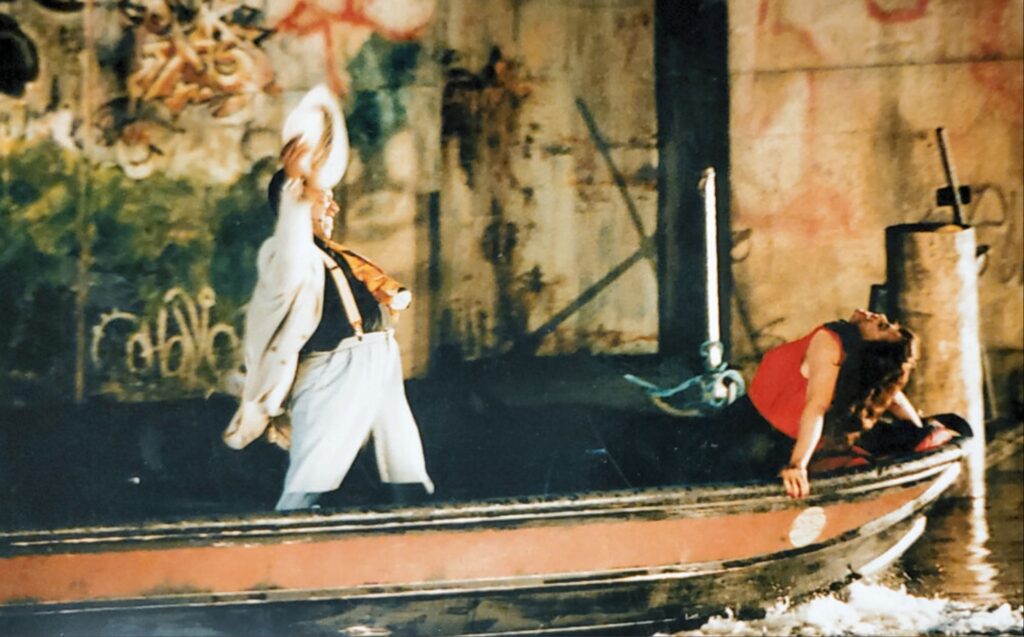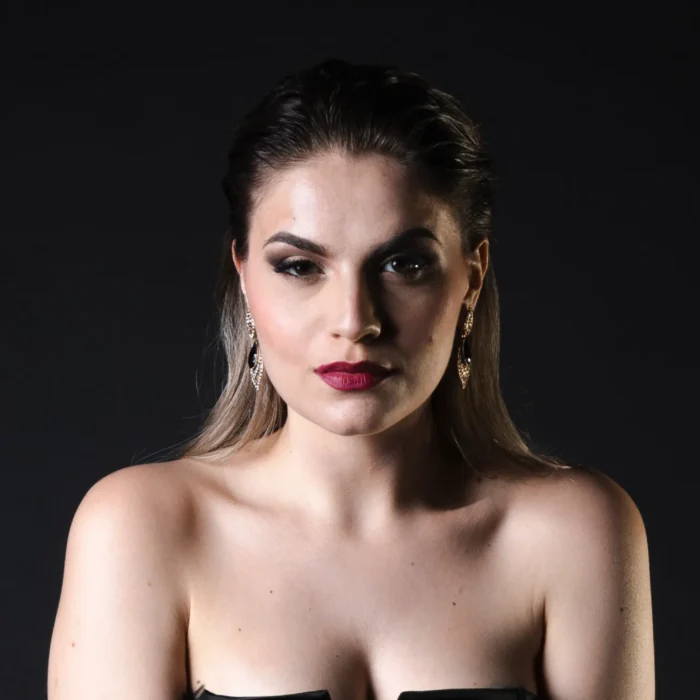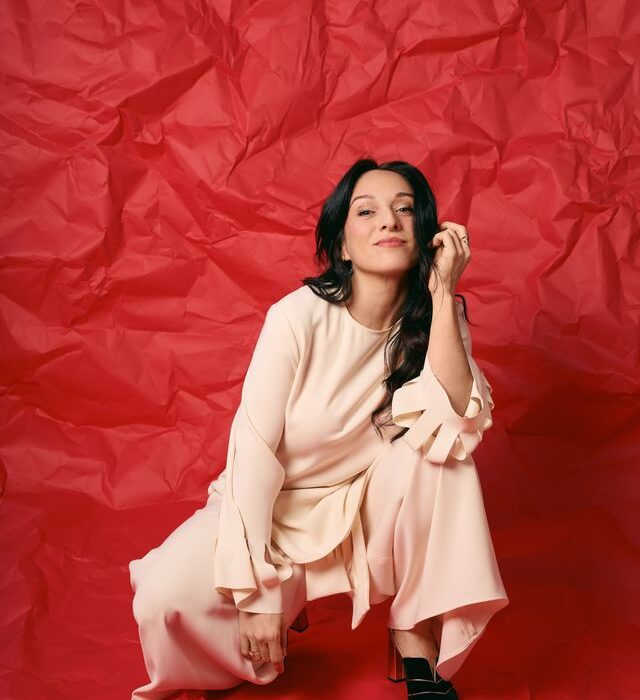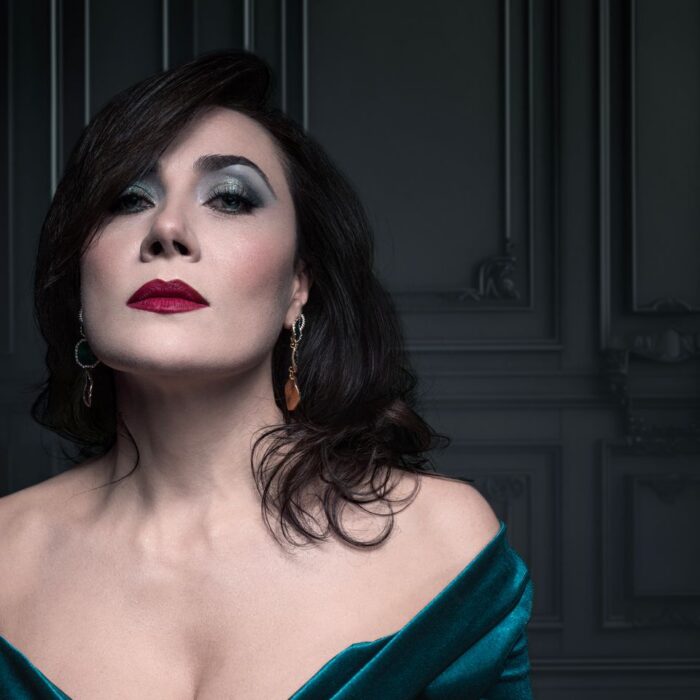
Q & A: Soprano Marquita Lister on Singing Bess Around the World & How She Pursued Her Opera Career
By Lisa Winkler(Photo: Marquita Lister press)
As the Coordinator of the Vocal Studies Program and Director of Opera, soprano Marquita Lister is preparing for the school year at Morgan State University, where she teaches undergraduate and graduate students and directs fully staged operatic performances. She had a busy summer giving Master Classes and preparing professional singers for their operatic, concert, and recital performances. She’s also the Artistic Director of Opera Ebony and is planning the next two seasons. OperaWire connected with her to chat about her experiences, particularly her singing the role of Bess in “Porgy and Bess” around the world as the opera celebrates its 90th anniversary this year.
OperaWire: Many opera singers credit their start to experiences in junior and senior high school. A music teacher usually provided the inspiration. Is that your story?
Marquita Lister: I grew up in Washington, DC and attended public schools. As with many African American children, I grew up singing in church. The Baptist Church to be specific. We had many types of choirs; classical, gospel, men’s chorus, youth choir and the women’s chorus. It was a charismatic environment and experience. I participated in school choirs and school musicals beginning in elementary school.
When I reached Junior High School, the choir director told my mother she thought I had talent and would benefit from private voice lessons. My mother immediately secured Mrs. Margaret Massé, a well-respected teacher in the DC area. I started lessons when I was 13 years old. Mrs. Massé heard my potential and saw my love for the craft, and believed that I could have a singing career, especially in opera. She suggested that my mother consider sending me to a music school. For one year, my mother allowed me to attend Western High School which is now known as the Duke Ellington School of the Arts. Following that year of intense music study, I transferred to a high school to focus more on academic excellence than arts. I continued to sing in choir and have private voice lessons.
OW: What was the first opera you ever saw?
ML: While I was in high school, the Houston Grand Opera (HGO) presented “Porgy and Bess” at the Kennedy Center. I saw Donnie Ray Albert sing Porgy and Clamma Dale sing Bess. It was an incredible experience for me. As a teenager, I did not fully understand the depth of the story, except for the fact that “happy dust” (cocaine) causes problems in one’s life, and that love is powerful. What grabbed my attention most was the diversity of the music: the vendor street cries, the arias and duets, the big chorus scenes, and of course, the powerful voices and sweeping orchestral score.
OW: Were your parents supportive of your decision to pursue an opera career?
ML: While my mother was an opera and gospel enthusiast and my father loved jazz, they didn’t expect me to pursue music. Both parents thought I had a curious mind. My mother, an educator, wanted me to become a journalist and my father, a mental health professional, wanted me to follow in his footsteps.
When it came time to apply to college, I told them, “Why did I take all these voice lessons if I’m not going to continue with music?” They insisted I apply to non-music schools in addition to conservatories. I compromised, saying I’d apply to one conservatory and a few other universities. I said, “if I get into New England Conservatory of Music, you have to allow me to attend.” I wanted to go there because it was a small school, and soprano Eleanor Steber and Coretta Scott King were alumnae.
OW: What happened?
ML: Well, I was very lucky. I turned down admission to two Ivy League schools and enrolled in the New England Conservatory of Music. Then I earned my Master’s in Music from Oklahoma City University.
OW: Your career seems to have taken off quickly. You won the regional Metropolitan Opera Auditions, then apprenticed with the Houston Grand Opera, and debuted there in Aida soon after, and received many more roles in San Francisco, Portland, Austin, Chicago, Vancouver, to name a few. What have been the most difficult parts of your journey?
ML: I feel blessed to have gotten into the HGO Studio Program. They were very supportive of me, giving me many stage opportunities. It is through this program that I secured my first agent. My career was gaining momentum, but then things started to slow down; I was a bit nervous about what to do. After a period of trial and error, I found an agent who was very “team Marquita,” and advised to pursue opera in Europe where I would have opportunities to expand my repertoire.
OW: Was it good advice?
ML: Yes. I was allowed to stretch and grow with very diverse and challenging roles. Dream roles!! Europe, particularly, became an important part of my career and journey with repertoire and artistry. I was back and forth between the US and Europe for many years.
OW: Any highlights from that period? Any favorites?
ML: All my roles are favorites for different reasons. I loved that I was singing women who had depth. Tosca, Aida, Santuzza, Nedda, Elizabetta. But there was none like Salome. It’s vocally, physically, and dramatically a tour-de-force. To sing such an iconic role in Germany was incredible. As my repertoire got heavier in vocal expectation, my career grew. However, my experience singing Bess for the first time stands out. I went on to sing the role all over world over a twenty-year time period.

(Photo: Marquita Lister press)
OW: It’s written you performed Bess more than 500 times. How did it begin?
ML: In 1989, I was engaged to perform Clara in London under the baton of Maestro John DeMain. Clamma Dale, starring as Bess, became unwell and could not sing. Maestro DeMain immediately came to me saying, “you’ll perform Bess.” I was excited and terrified. I had never sung it or studied it. How could I learn and memorize such a demanding role in such a short period? How would I prepare the complexity of colors the character requires? Drug addiction, love, and fear. It is a very challenging role physically, vocally and emotionally. Thankfully, Maestro DeMain was hands on; teaching me every note and rhythm as we prepared for what would be a life-changing moment in my career.
OW: How do you see Bess?
ML: She’s tragic and broken. She’s a drug addict who looks for love in all the wrong places. She has no self-esteem. She allows herself to be drawn into this triangle between Crown, Porgy and Sportin’ Life. Yet she sees that Porgy truly loves her. Thanks to him, the Catfish Row community supports and takes care of her. She doesn’t trust that her relationship with Porgy and the community will endure, so she leaves with Sportin’ Life, believing her life will be better.
OW: You met Anne Brown, the first soprano to sing Bess, after your appearance in the role in Oslo, where she lived. What did you talk about?
ML: It was actually on her 90th birthday. I wished her a happy birthday and she praised the performance. I asked her what was it like to be the first Bess. I remember, she smiled and said, “it was marvelous.” I wanted to ask her what it was like to work with George Gershwin. Unfortunately, we didn’t have the time.
OW: “Porgy and Bess” continues to be controversial. Some singers say it “pigeon-holes” them; some say it’s an essential part of the canon. Where do you fall?
ML: It is important for Black opera singers to mix their seasons so they’re not labeled as just being a “Porgy and Bess” singer. That said, the opera is an essential part of the canon of American operas and has given – and continues to give- African American artists a platform to perform. I am grateful and humbled to be considered the quintessential Bess. Every performance brings new experiences that keep the show fresh. Every Porgy, Sportin’ Life, and Crown bring different chemistries to the stage and every audience provides a variety of responses to the opera.
OW: How was performing “Porgy and Bess” overseas different than performing it in the US?
ML: International productions are nothing like what I’ve done in the United States. They’re more avant-garde. I remember one production with Theater Des Westens produced in Berlin, Germany. An actor played Abraham Lincoln who was seated in a box overlooking the stage. That’s some powerful symbolism.
For a performance at the Bregenzer Festspiele, on the Seebühne, a massive two-level floating stage of concrete and steel on Lake Constance, Porgy appeared in a golf cart, dancers emerged from the walls like swirls of graffiti coming out of the walls, and a speed boat takes Bess and Sportin’Life to New York.

(Photo: Marquita Lister press)
Yet “Porgy and Bess” is universal, wherever it’s set. It’s not a black story, it’s a human story that people love. We all know that there are bad people, that too often women love the wrong men, and that many are afraid of true love. Characters like Crown, who “live hand to mouth,” women like Serena who is like Mother Earth keeping the community together remind audiences of these situations. Gershwin happened to set his opera in a black community, but it transcends everywhere. His amazing music coupled with a compelling narrative sells the show.
OW: Let’s talk about your teaching at Morgan. What inspires you? How do you get young people excited about pursuing opera careers?
ML: First, one must love the music and be open to foreign languages. Opera is a sung story. If the librettist and composer have set the story well, and it is sung and acted convincingly, people will be drawn in. Students are fascinated about my career, how I sang so many roles in so many places.
I try to inspire and develop their work ethic, and commitment to the craft. They must love their singing voice, have solid vocal technique, good musicianship, and acting chops in order to be a contender in the performance world. There are many talented students at Morgan. Some with world-class career potential. I am very honest with them about how difficult building a career is. It is a process. It takes dedication, persistence, and passion to endure the ups and downs that come with finding your “repertoire niche.” The competitive singing pool is enormous. Dare to dream. Dreams can come true. Mine did.
OW: Your production of “Treemonisha” was wonderful. Was it well received? What’s next?
ML: Yes, it sold very well, thanks to social media, radio interviews and word of mouth. This year we’re collaborating with the Peabody Institute to produce Kurt Weill’s “Street Scene.” Their auditorium is under renovation and they asked to use ours. I suggested we do something together. It’s a huge opera so it’s perfect for two schools.
OW: And you’re getting back into singing. Can you give us a hint what you’ll be doing?
ML: A work is being commissioned for me and a friend for 2027 but I do hope to get back on the stage in 2026 too.

(Photo: Marquita Lister press)
Categories
Interviews


